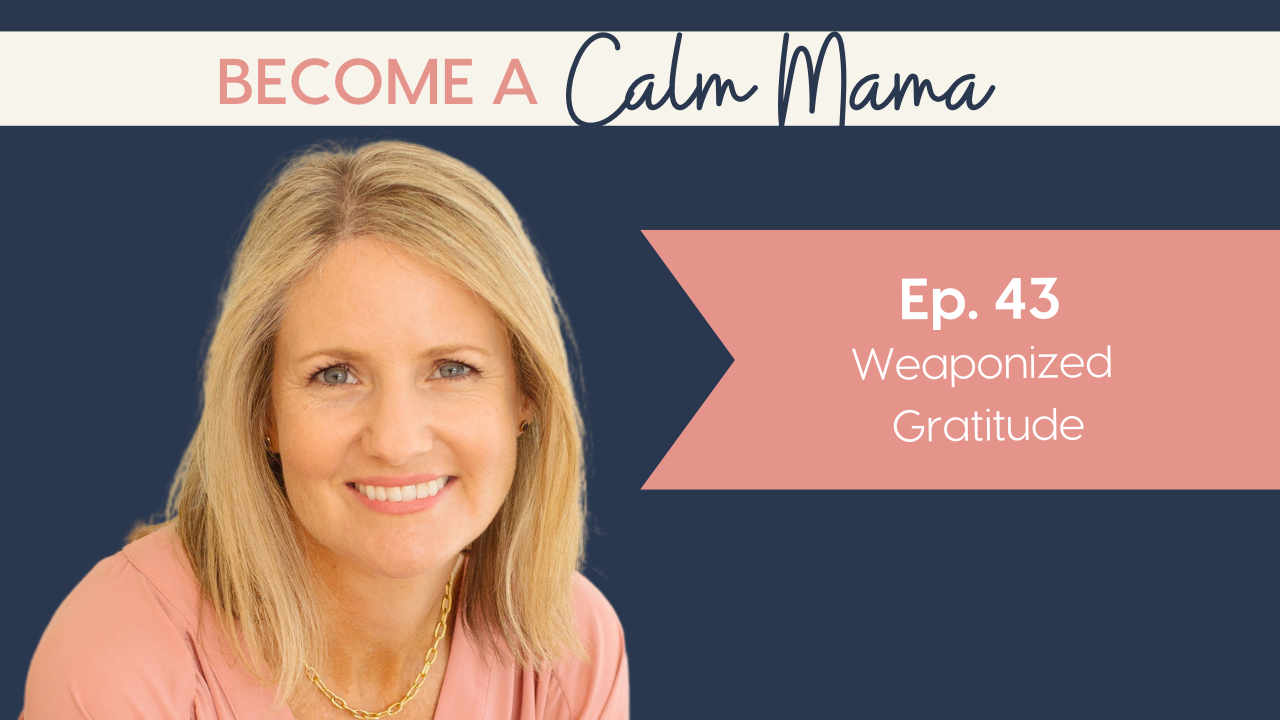
Weaponized Gratitude
Nov 23, 2022With this podcast episode released on Thanksgiving, I’m talking all about gratitude, how it relates to children and parenting, and what I'm calling weaponized gratitude.
What is gratitude?
In Brene Brown's book, Atlas of the Heart, she defines gratitude as, “an emotion that reflects our deep appreciation for what we value, what brings meaning to our lives, and what makes us feel connected to ourselves and others.”
It isn’t just about saying thank you, it’s an emotion. And it requires that we look for the good and take the time to fully feel that appreciation.
This isn’t something that comes naturally to humans, so it is a perspective and mindset that we need to cultivate and practice.
The good news is that when you do that practice, it can become really easy to access those thankful thoughts and feelings.
Gratitude and kids
Gratitude is really hard for our kids, and here’s why.
First, it has to do with their developmental stage. Because of the way their brains are developed, kids aren’t really able to see different perspectives until around age 9 or 10.
Also, many of our kids don’t experience a lot of struggle. As parents, we want our kids' lives to be mostly simple, easy and happy. So for them, good is the norm. They don’t have much other life experience yet to compare it with. Basically, they don’t know how good they’ve got it.
In many ways, we’ve taught them that. We've taught them to expect ease. We've taught them to think that the world revolves around them.
But then we get mad at them when they're not feeling grateful for a nice house or a loving family or whatever you want your kids to be grateful for.
You don’t have to make them wrong for their ignorance or lack of perspective. It’s a part of development.
The best way for you to cultivate gratitude in your kids is to model it for them in a positive way.
Weaponizing gratitude
Something I see often as a coach is when a mom starts to share with me a challenge in her life and expresses her feelings, like hurt, disappointment or sadness, and she stops herself and sort of backs up a bit. Then, she says things like, “I shouldn't even be complaining,” “I’m being so whiny,” “I know I have it better than other people.”
This is what I think of as weaponizing gratitude. You are using gratitude as a weapon to shut down your feelings.
We all have lots and lots of feelings. And sometimes those feelings are not so great. But we don't need to judge our negative feelings and then tell ourselves we should be grateful.
Trying to ignore the feeling, manufacture gratitude and bypass your negative emotions does not work. It doesn’t help you.
What you need is a safe place to dump some of the junk that's going on. You need to have your feelings acknowledged, allowed and accepted, either by yourself or by whoever you're talking to.
The other side of gratitude
Now don’t get me wrong - I love gratitude. But I can only feel that feeling of gratitude because I've opened myself up to all the other feelings, the anger, the resentment, the sadness, the disappointment, the grief. All any feeling ever wants us to be felt.
Gratitude is a wonderful emotion, but you cannot fake it. It's the calm after the storm. Because gratitude is really perspective. And perspective only comes when we take an honest account of our lives, when we're looking at what is hard and what is great.
It's okay to feel disappointed. It's okay to feel angry, it's okay to feel sad. It's okay to feel hurt. None of these are the opposite of gratitude, but we have to acknowledge them all.
Once you process your negative emotion, gratitude is on the other side.
3 strategies to cultivate more gratitude
There are three practices that have helped me access gratitude faster. When I use these strategies regularly, they help me shift towards gratitude with greater ease once I have moved through my negative emotion.
You can use these on your own or with your kids to cultivate more gratitude within your family.
#1 As part of my daily journaling, I complete this sentence, “I am grateful for _____ because ______.” I love adding the “because” to this sentence. Adding the benefit or reason I am grateful for what I’ve focused on for that day deepens my appreciation of it.
#2 Write a list of 10 things you really really wanted in the past and now you have. This is a great exercise for perspective and finding genuine gratitude!
#3 Switch the focus of the holiday season from 'getting' to 'giving': Bring your kids into the gift giving process and allow them to pick out gifts for others.
Set a budget and talk about the reason you chose that amount for each gift.
Let the kids pick gifts within the range. Have them wrap them. The more invested they are in giving, the less focus they will have on receiving.
You’ll Learn:
- Why we have to practice gratitude (it doesn’t come naturally)
- How to help your kids be more grateful
- Why “good vibes only” isn’t actually so good
- 3 strategies for cultivating more gratitude in your family
Resources:
- Atlas of the Heart by Brene Brown
Ready to stop yelling?
Get the one simple tool you need to stop yelling at your kids, so you finally feel calmer and connect better.
You'll learn why you yell, how to stop yourself yelling, 40 things to do instead and scripts for what to say to your kid when you yell.

